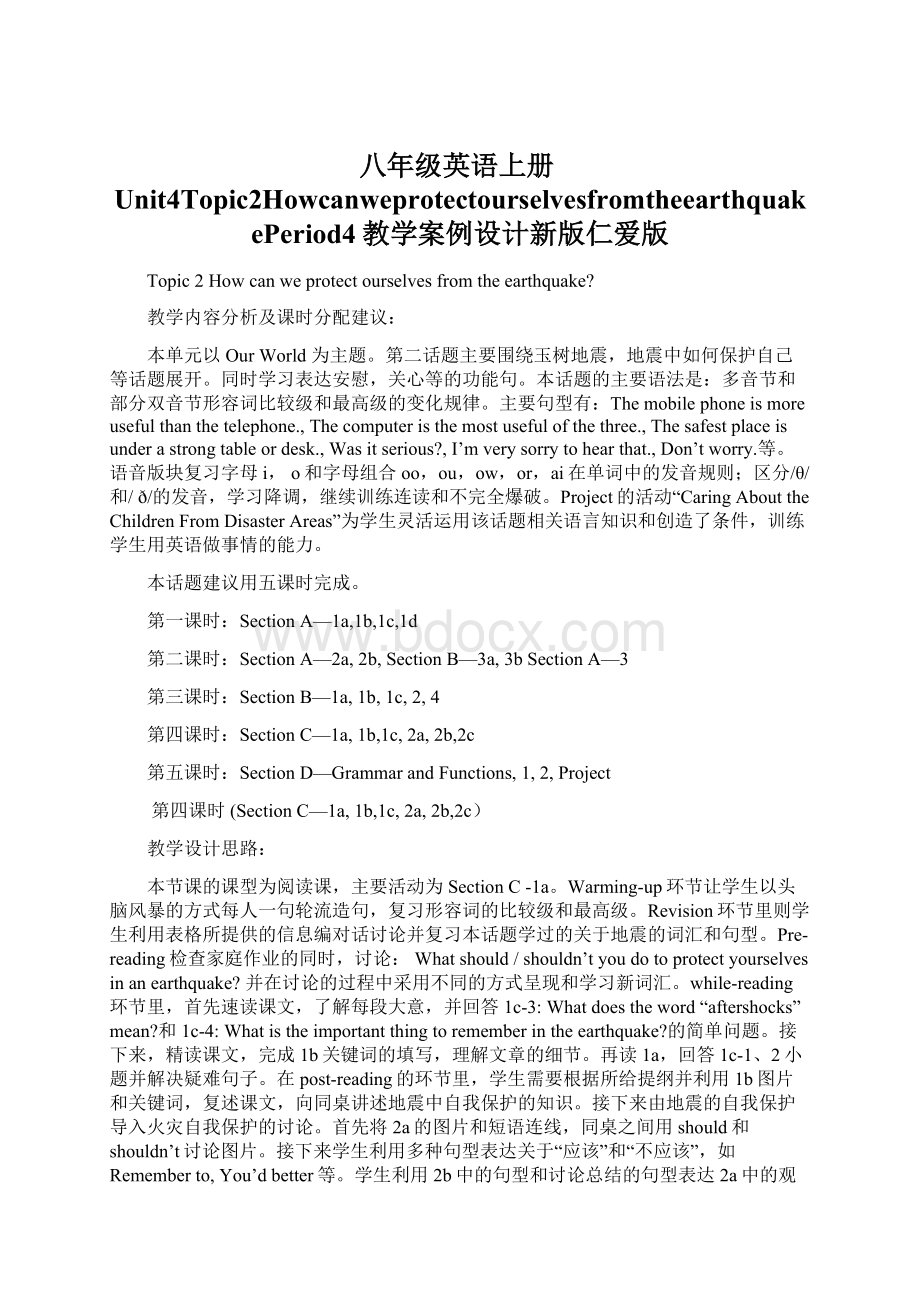八年级英语上册Unit4Topic2HowcanweprotectourselvesfromtheearthquakePeriod4教学案例设计新版仁爱版.docx
《八年级英语上册Unit4Topic2HowcanweprotectourselvesfromtheearthquakePeriod4教学案例设计新版仁爱版.docx》由会员分享,可在线阅读,更多相关《八年级英语上册Unit4Topic2HowcanweprotectourselvesfromtheearthquakePeriod4教学案例设计新版仁爱版.docx(12页珍藏版)》请在冰豆网上搜索。

八年级英语上册Unit4Topic2HowcanweprotectourselvesfromtheearthquakePeriod4教学案例设计新版仁爱版
Topic2Howcanweprotectourselvesfromtheearthquake?
教学内容分析及课时分配建议:
本单元以OurWorld为主题。
第二话题主要围绕玉树地震,地震中如何保护自己等话题展开。
同时学习表达安慰,关心等的功能句。
本话题的主要语法是:
多音节和部分双音节形容词比较级和最高级的变化规律。
主要句型有:
Themobilephoneismoreusefulthanthetelephone.,Thecomputeristhemostusefulofthethree.,Thesafestplaceisunderastrongtableordesk.,Wasitserious?
I’mverysorrytohearthat.,Don’tworry.等。
语音版块复习字母i,o和字母组合oo,ou,ow,or,ai在单词中的发音规则;区分/θ/和/ð/的发音,学习降调,继续训练连读和不完全爆破。
Project的活动“CaringAbouttheChildrenFromDisasterAreas”为学生灵活运用该话题相关语言知识和创造了条件,训练学生用英语做事情的能力。
本话题建议用五课时完成。
第一课时:
SectionA—1a,1b,1c,1d
第二课时:
SectionA—2a,2b,SectionB—3a,3bSectionA—3
第三课时:
SectionB—1a,1b,1c,2,4
第四课时:
SectionC—1a,1b,1c,2a,2b,2c
第五课时:
SectionD—GrammarandFunctions,1,2,Project
第四课时(SectionC—1a,1b,1c,2a,2b,2c)
教学设计思路:
本节课的课型为阅读课,主要活动为SectionC-1a。
Warming-up环节让学生以头脑风暴的方式每人一句轮流造句,复习形容词的比较级和最高级。
Revision环节里则学生利用表格所提供的信息编对话讨论并复习本话题学过的关于地震的词汇和句型。
Pre-reading检查家庭作业的同时,讨论:
Whatshould/shouldn’tyoudotoprotectyourselvesinanearthquake?
并在讨论的过程中采用不同的方式呈现和学习新词汇。
while-reading环节里,首先速读课文,了解每段大意,并回答1c-3:
Whatdoestheword“aftershocks”mean?
和1c-4:
Whatistheimportantthingtorememberintheearthquake?
的简单问题。
接下来,精读课文,完成1b关键词的填写,理解文章的细节。
再读1a,回答1c-1、2小题并解决疑难句子。
在post-reading的环节里,学生需要根据所给提纲并利用1b图片和关键词,复述课文,向同桌讲述地震中自我保护的知识。
接下来由地震的自我保护导入火灾自我保护的讨论。
首先将2a的图片和短语连线,同桌之间用should和shouldn’t讨论图片。
接下来学生利用多种句型表达关于“应该”和“不应该”,如Rememberto,You’dbetter等。
学生利用2b中的句型和讨论总结的句型表达2a中的观点,并写下来与同桌交流,为2c的书面表达做准备。
最后,写一篇关于如何在火灾中自我保护的文章,在全班汇报。
Ⅰ.Teachingaims
1.Knowledgeaims:
(1)学习并掌握新词汇:
middle,shake,check
downstairs,indoors,doorway,furniture,power,shock,aftershock,gas
(2)通过阅读学习在地震中自我保护的知识。
2.Skillaims:
(1)能在图片或关键词的帮助下读懂介绍自然灾害的文章,以及相应的保护措施。
(2)能流利地和他人谈论在自然灾害中如何保护自己。
(3)能正确模仿本课课文,有条理地写出在自然灾害中如何保护自己的措施。
3.Emotionalaims:
(1)在灾害中有自我保护的意识和能力并能沉着应对。
(2)在自己的能力范围之内,帮助别人。
4.Cultureawareness:
Ⅱ.Thekeypointsanddifficultpoints
1.Keypoints:
(1)学习在地震中如何保护自己的知识。
(2)与他人谈论在自然灾害中如何保护自己。
(3)能模仿本课所学文章,写一篇有关其它灾害的文章。
2.Difficultpoints:
能模仿本课所学文章,写一篇有关其它灾害的文章。
Ⅲ.Learningstrategies
1.能利用图片的提示,记忆和复述课文。
2.引导学生善于总结归纳语言。
Ⅳ.Teachingaids
多媒体课件/图片
V.Teachingprocedures
Stage1(5mins):
Gettingstudentsreadyforlearning
Step
Teacheractivity
Studentactivity
Designingpurpose
(Classactivity)
Greetthestudentsandgetthem
readyforlearning.Leadthestudentstoreviewcomparativeandsuperlativedegreesofadjectives.
T:
Goodmorning,everyone!
T:
Let’sbrainstormasmanysentencesaspossibleusingcomparativeandsuperlativedegreesofadjectives.Youmuststandupquicklyandsayoutsentencesaloudonebyone.Let’sbegin!
Focustheirattentiononthe
teacher.Makesentencesto
reviewcomparativeandsuperlativedegreesofadjectivesaccordingtothepictures.
Ss:
Goodmorning,Miss…
S1:
Myschoolbagisbiggerthanhers.
S2:
…
Remark:
这一环节的目的是要创造学习英语的氛围并使学生静下心来,开始新的学习。
可以采用多种方式,如唱歌、游戏、值日报告、自由讨论等。
Stage2(5mins):
Revision
Step
Teacheractivity
Studentactivity
Designingpurpose
(Pairwork)
Showthetablesandaskthestudentstochoosesomeoftheearthquakestotalkabout.
Workinpairsandmakeconversationstotalkabouttheearthquakeswiththehelpofthetables.
Ss:
…
根据表格所给信息,两人一组讨论中国近一些年来发生的地震,复习本话题学过的词汇,句型等内容。
Remark:
Stage3(5mins):
Pre-reading
Step
Teacheractivity
Studentactivity
Designingpurpose
1(Classactivity)
Checkthehomework.Leadtothetopicofself-protectioninanearthquakeandteachthenewwords.
T:
Anearthquakeisakindofveryterriblenaturaldisaster.Mostlywecannotavoidthem,butwecantrytoprotectourselves.Haveyoufoundmoreinformationabouthowtoprotectyourselvesfromanearthquake?
T:
Youcanshareyourinformationwithyourpartnersfirst.Andcheckwhatweshoulddotoprotectourselvesintheearthquakebasedonyourownknowledge.Later,we’lltalkmoreaboutit.
T:
Good.Youhaveawarmdiscussion.Well,whatshould/shouldn’tyoudotoprotectyourselvesinanearthquake?
Whowouldliketoshareyouropinions?
T:
Iagreewithyou.Thesafestplaceisunderastrongtableoradesk.Lookatthesetwopictures.
doorwaymiddle
T:
Doyouthinkwhereissaferindoors,inthedoorwayorinthemiddleoftheroomwhenanearthquakehappens?
T:
Ithinkso.Sittingonthefloorinthedoorwayissaferthanstandinginthemiddleoftheroom.Lookatthepicture,itisfurniture.
T:
Doyouthinkwhetheritissafetostaynearthetallfurniture?
T:
Ifyoutrytogoout,canyoutakealifttogodownstairs?
T:
Yes.Infact,youshouldn’ttrytogooutofthebuilding.It’smoredangerous.Anyway,Ithinkkeepingcalmisthemostimportant.
Talkabouthowtoprotectthemselvesandlearnthenewwords.
Ss:
Yes,wehave.
Ss:
…
S1:
Weshouldstayunderastrongtable.
S1:
Ithinkweshouldsitonthefloorinthedoorway.
S2:
Idon’tthinkso.Itmayfalldownandhurtus.
S3:
No.
Remark:
Stage4(10mins):
While-reading
Step
Teacheractivity
Studentactivity
Designingpurpose
1(Classactivity)
Leadthestudentstoskimthepassageandfindthemainideaofeachparagraph.Answerthequestion3-4in1c.
T:
We’llreadapassageabouthowtoprotectourselvesintheearthquake.Skimitandfindthemainideaofeachparagraph.Oryoumayunderlinethetopicsentenceofeachparagraph.
T:
What’sthekeysentenceofthefirstparagraph?
T:
Whatdoesthewritertellusinthesecondparagraph?
T:
Andhowaboutthethirdparagraph?
T:
Wonderful!
What’sthetopicsentenceofthefourthparagraph?
T:
Yes.Therewillbesomeshocksaftermostearthquake.Wecallthemaftershocks.Canyouguesswhat“aftershock”means.
T:
Whatdoesthemainideaofthelastparagraph?
T:
Sowhatisthemostimportantthingtodointheearthquake?
Skimthepassageandfindthemainideaofeachparagraph.Answerthequestion3-4in1c.
Ss:
…
S1:
Knowingsomewaystoprotectyourselfwillhelptokeepyousafeintheearthquake.
S2:
Hetellsushowtoprotectourselvesifweareindoorswhenanearthquakehappens.
S3:
Itisabouthowtoprotectourselvesifweareoutdoors.
S4:
Thedangerisnotoverwhenthestrongshakingstops.
S5:
Itmeans“余震”inChinese.
S6:
Trytohelpothersandstaycalm.
S7:
Stayingcalmisthemostimportantthingtodo.
2(Individualwork)
Leadthestudentstoreadthepassagecarefullyandfinish1b.
T:
Thepicturesin1bareabouthowtoprotectourselvesindoorsandoutdoorsintheearthquake.Nowlet’sreadthepassagecarefullyandwritedownthekeywordsundereachpicture.
T:
Whatshouldyoudoifyouareindoors?
Readthepassagecarefullyandwritedownthekeywordsundereachpicturein1b.Thenretellwhattheyshoulddobasedonthepicturesandthekeywords.
Ss:
…
S1:
…
3(Classactivity)
Dealwiththekeypointsanddifficultsentencesofthepassage.
T:
Whenwementionearthquakes,wefeelterrible.Itseemsthatalltheearthquakesareserious.Butwhencanearthquakesbeveryseriousaccordingtothepassage?
T:
Why?
T:
Howdoyouunderstand“thedangerisnotoverwhenthestrongshakingstops”?
T:
Whydoesthewritersayso?
T:
Doyouhaveanydifficultyunderstandingthispassage?
Readonceagainandfindoutthekeypointsandthedifficultsentences.
S1:
Whentheearthquakeshappennearacity,theycanbeveryserious.
S1:
Ifanearthquakehappensnearacity,morepeoplemaybehurtordie.
S2:
地震停止了,危险并没有结束。
S3:
Becauseoftheaftershock.Sometimestheycanbemoredangerousthanthefirstearthquake.
Ss:
…
Remark:
Stage5(17mins):
Post-reading
Step
Teacheractivity
Studentactivity
Designingpurpose
1(Pairwork)
Leadthestudentstoretellthepassageaccordingtothepicturesandthekeywordsin1b.
Retellthepassageinpairsaccordingtothepicturesandthekeywordsin1b.
为了降低难度,教师还可以给学生提供如图所示的提纲。
2(groupwork)
Leadthestudentstomatchthephraseswiththecorrectpicturesin2a.
T:
Asweallknow,wemayencountersomeemergenciesinourlife.Wecan’tavoidallofthem.Soitisveryimportantforustoknowsomewaystoprotectourselvesinsuddendisasterssuchasearthquakesandfires.Doyouknowwhatyoushouldandshouldn’tdoinafire?
Lookatthepicturesin2bandmatchthephraseswiththem.
T:
Discussingroupswhatyoushouldandshouldn’tdoinafirebasedonthepicturesandthephrases.
Finish2awiththeteacher’sguide.
Ss:
…
S1:
Weshouldn’ttakealift.
S2:
Weshouldcall119forhelp.
…
3(Pairwork)
Leadthestudentstofindmoreusefulexpressionstoexpress“shouldandshouldn’t”.
T:
Whenwegivesuggestions,weoftensay“youshould…”or“youshouldn’t…”.Butinfact,wecanusemoreusefulexpressionstoexpressthesameideas.Canyouthinkofmorestructures?
T:
Youdidagoodjob.Pleaseusetheexpressionsyousummarizedandtheonesinthetablein2bandrewritethesentencesbasedon2aandexchangeideaswithyourpartners.Forexample,Don’tjumpoffthewindow.
Findmoreusefulexpressionstoexpress“shouldandshouldn’t”.Thenwritedownthesentencesbasedon2aandexchangeideaswiththeirpartners.
S1:
You’dbetter…
S2:
Don’t…
S3:
It’sagoodwayto…
S4:
Whydon’tyou…
S5:
Yououghtto…
S6:
Youmustn’t…
S7:
Rememberto…
…
Ss:
…
讨论和总结更多关于应该和不应该的表达法,如Rememberto,You’dbetter等。
学生利用2b中的句型和讨论总结的句型表达2a中的观点,并写下来与同桌交流,为2c的书面表达做准备。
4(Groupwork)
Askthestudentstowriteashortpassageabouthowtoprotectthemselvesinafireaccordingto2aand2b.
T:
I’msureyoucanprotectyourselvesverywellinafire.Doyouwanttosharethewaystoothers?
Let’swritethemdownandthenyoucanreportthemtotheclass.
T:
Whowouldliketoreadyourcompositionandshareyourgoodwayswithus?
Writeashortpassageabouthowtopro